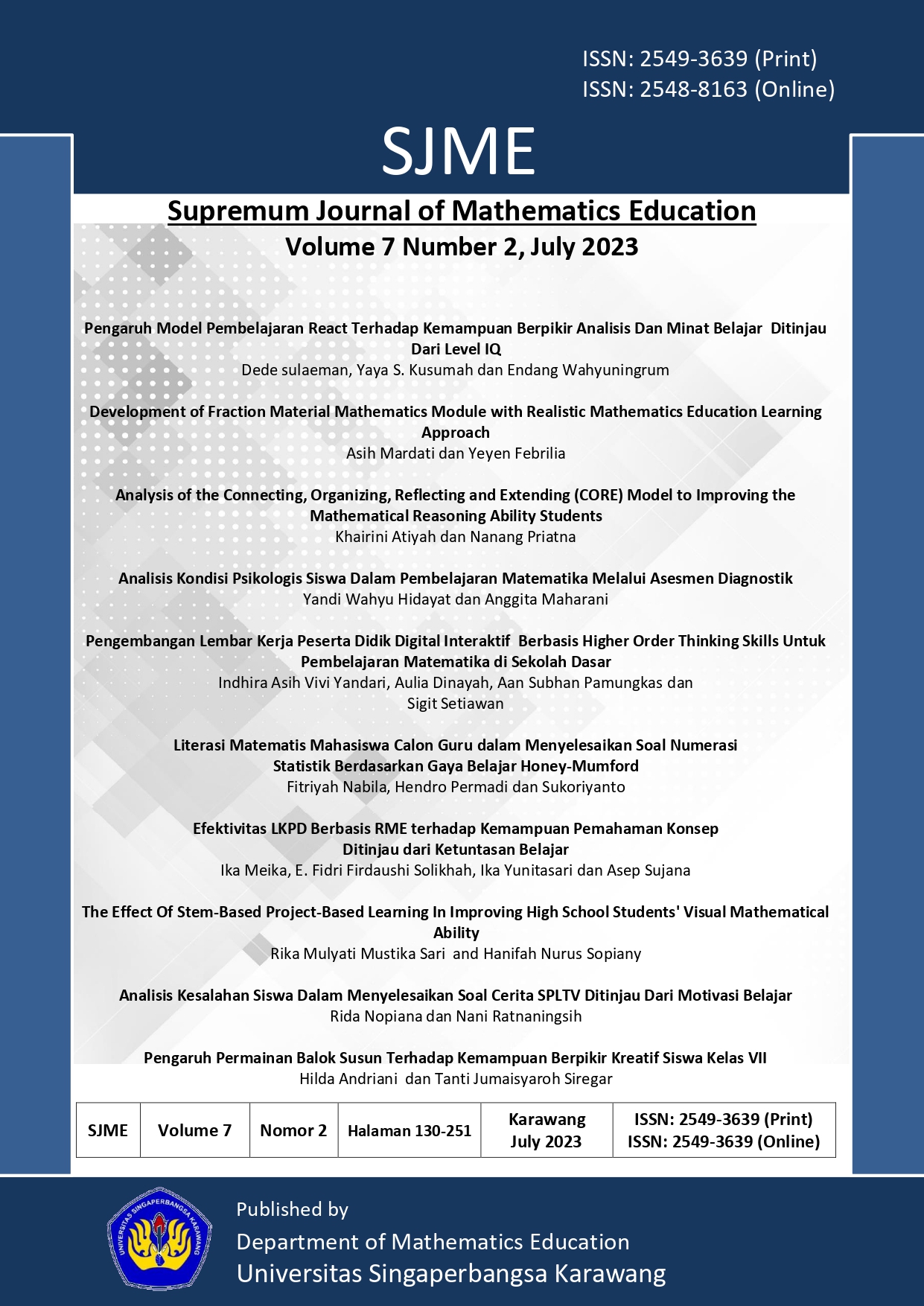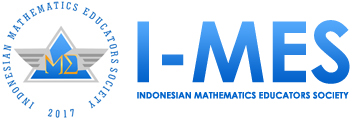Pengaruh Model Pembelajaran React Terhadap Kemampuan Berpikir Analisis Dan Minat Belajar Ditinjau Dari Level IQ
DOI:
https://doi.org/10.35706/sjme.v7i2.8704Abstract
This study uses a quantitative approach with quasi-experimental research. This study aims to 1) examine the effect of applying the REACT learning model on students' analytical thinking skills in terms of Intelligence Quotient (IQ) in class XI IPA. 2) Assess the effect of the application of the REACT learning model on students' learning interest in terms of IQ in class XI IPA. 3) Assessing the effect of the interaction of learning models and Intelligence Quotient (IQ) on students' analytical thinking skills in class XI IPA. 4) Assessing the effect of the interaction of learning models and Intelligence Quotient (IQ) on students' learning interest in class XI IPA. The population in this study were all students of class XI IPA SMA Islam Dian Didaktika Cinere Depok, samples were taken from two classes XI IPA with Cluster Random Sampling, while the design used was treatment by level design. The results show that 1) There is an effect of the application of the learning model on students' analytical abilities 2) There is no effect of the application of the REACT learning model on students' learning interest between the experimental and control groups. 3) There is an interaction between the REACT and Intelligence Quotient (IQ) learning models on students' analytical thinking skills. 4) There is no interaction between learning models and Intelligence Quotient (IQ) on students' learning interest.
Downloads
References
Aini,F.N., Suprakarti, S, dan Sari, P. (2017). Penerapan Strategi REACT (Relating, Experiencing, Applying, Cooperating, Transferring) untuk meningkatkan kemampuan koneksi matematis pada pokok bahasan bangun datar di kelas VII-2 SMP Negeri 47 Jakarta. Jurnal riset pembelajaran matematika sekolah Vol.1 no.1
Anderson, L. W., & Krathwohl, D. R. (2010). A Taxonomy for Learning, Teaching, and Assessing: A Revision of Bloom's Taxonomy of Educational Objectives. A Bridged Edition. New York: David McKay Company, Inc.
Ardana, dkk. 2018. Budaya Dalam Pembelajaran Matematika. Depok: Raja Grafindo Persada
Arikunto, Suharsimi.(2012). Dasar-dasar Evaluasi Pendidikan Cet. I. Jakarta: Bumi Aksara.
Arnold, R. D., & Wade, J. P. (2015). A Definition of Systems Thingking : A Systems Approach. Procedia Computer Science,¬¬¬¬
Aulia H Durotulaila, M Masykuri, Bakti Mulyani, Pengaruh Model Pembelajaran REACT (Relating, Experiencing, Applying, Cooperating, Transferring) Dengan Metode Eksperimen dan Penyelesaian Masalah Terhadap Prestasi Belajar Ditinjau Dari Kemampuan Analisis Siswa
Bilfaqih, Y., & Qomarudin, M. N. (2015). Esensi Penyusunan Materi Pembelajaran Daring. Yogyakarta: Deepublish
Darwati, Y. (2015). Keterlambatan Mahasiswa Dalam Studi Ditinjau Dari Teori Atribusi Dari Weiner (Upaya Mencari Solusi atas Keterlambatan Mahasiswa dalam Studi di Prodi Psikologi Islam STAIN Kediri). Universum. Vol. 9. No. 1 hlm. 57-65.
Departemen Pendidikan Nasional. (2000). Manajemen Peningkatan Mutu Berbasis Sekolah h.3.
Djamarah, Syaiful Bahri. (2013). Strategi Belajar Mengajar. Cetakan Kelima. Jakarta: PT. Rineka Cipta.
Fathurrahman, Muhammad. (2015). Model Model Pembelajaran Inovatif. Jakarta: Ar-Ruzz Media
Febryana, E., Sudiana, R., & Pamungkas, A. S. (2023). Analisis Kesalahan Siswa Dalam Menyelesaikan Soal Matematika Bertipe HOTS Berdasarkan Teori Newman. SJME (Supremum Journal of Mathematics Education), 7(1), 15–27. https://doi.org/10.35706/sjme.v7i1.6586
Kao, C.-y. (2016). Analogy’s Straddling of Analytical and Creative Thinking and Relationships to Big Five Factors of Personality.Thinking Skills and Creativity. Thinking Skills and Creativity
Khodijah, Nyanyu. (2014). Psikologi Pendidikan. Jakarta: PT. Raja Grafindo. Persada
Laelasari, dkk. 2015.Penerapan Model Pembelajaran Learning Cycle 7e Dalam Kemampuan Representasi Matematis Mahasiswa. Jurnal Euclid. Vol.1, No.2 pp.82-92
Mashudi. (2013). Desain Model Pembelajaran Inovatif Berbasis Konstruktivisme. Tulungagung: STAIN Tulungagung Press
Mulyani, Sri. (2017). Pengaruh Intelligence Quotient (IQ), perhatian orang tua dan kedisiplinan terhadap prestasi belajar IPS. Jurnal Penelitian dan IPS (JPPI), vol.11, No.2.
Novri,U.S. Zulfah. Dan Astuti. (2018) . Pengaruh strategi REACT (Relating, Experiancing, Applying, Cooperating, Transferring) terhadap kemampuan pemahaman konsep matematis siswa kelas VII SMP Negeri 1 Bangkinang. Jurnal Cendikia: Jurnal Pendidikan Matematika, vol.2, No.2
Nurmala, A.D. dkk. (2014). Pengaruh Motivasi Belajar dan Aktivitas Belajar Terhadap Hasil Belajar Akuntansi, Vol.4 no.1.
P. Solving and F. Literacy, PISA 2012 Assessment and Analytical Framework PISA 2012 Assessment and Analytical Framework.
Pangerti, Budi (2015). Pengaruh Metode Tutor Sebaya Terhadap Motivasi Belajar, Minat Belajar Dan Hasil Belajar Matematika Kelas XI Ilmu Alam MAN Model Sorong. Jurnal Ilmu Pendidikan Indonesia, Volume 3, Nomor 1, Edisi Februari 2015, hlm. 30-49
Parnawi. (2019). Psikologi Belajar. Sleman: Deepublish.
Purnamasari, Erin, et al. (2016). Pengaruh Model React Terhadap Hasil Belajar SMA Negeri 1 Sungai Ambawang. Jurnal Pendidikan dan Pembelajaran Untan, vol. 5, no. 11.
Robbins, S.P, Timothy A. Judge. 2014. Perilaku Organisasi: Jilid 1. Jakarta: Salemba Empat
Rosyidah, U., Setyawati , A. ., & Qomariyah, S. . (2021). Analisis Kemampuan Penalaran dan Kemampuan Pemahaman Konsep Matematis Mahasiswa Pendidikan Matematika Pada Mata Kuliah Aljabar Dasar. SJME (Supremum Journal of Mathematics Education), 5(1). https://doi.org/10.35706/sjme.v5i1.4488 (Original work published January 29, 2021)
Saktiani, Dwi. (2016). Upaya Mengembangkan Kemampuan Berpikir Analitis Siswa Melalui Penerapan PBL Berwawasan Sets. (Online)
Setiawati, T., & Karpin. (2018). Modul 6 (Produk Kreatif dan Kewirausahaan). Diakses dari http://ejournal.upi.edu/index.php/Boga/article/viewFile/8412/5283
Slameto. (2013). Belajar dan faktor-faktor yang mempengaruhinya. Jakarta: Rineka Cipta.
Tim Direktorat Pembelajaran. (2019). Panduan Proses Pembelajaran Daring - SPADA. Ristekdikti
Wardani,S.Y., & Trisnani , R.P (2018). INFORMASI KARIR. UNIFMA PRESS
Yudiprasetya,. I Dewa Putu, Ni ketut suarni, MS dan Ni Wayan Rati (2014). Pengaruh Strategi REACT dan motivasi belajar tehadap hasil belajar kelas V SD. E-journal UNDIKSA volume 2 nomor 1.
Yuniawatika. (2011). Penerapan Pembelajaran Matematika dengan Strategi REACT untuk Meningkatkan Kemampuan Koneksi dan Representasi Matematis Sekolah Dasar. Thesis. Bandung: UPI.
Zulaiha, Rika (2018). Pengaruh Metode Pembelajaran Mathemagic Terhadap Minat Dan Hasil Belajar Matematika Siswa Kelas IV MIN Rejotangan Tulungagung. Skripsi. Tulungagung: UIN Satu Tulungagung.
Zusnani, Ida (2013) Manajemen Pendidikan Berbasis Karakter Bangsa, Bandung: Platinum.
Downloads
Published
How to Cite
Issue
Section
License

This work is licensed under a Creative Commons Attribution-ShareAlike 4.0 International License.
Authors who publish with this journal agree to the following terms:
- Authors retain copyright and grant the journal right of first publication with the work simultaneously licensed under a Creative Commons Attribution License that allows others to share the work with an acknowledgment of the work's authorship and initial publication in this journal.
- Authors are able to enter into separate, additional contractual arrangements for the non-exclusive distribution of the journal's published version of the work (e.g., post it to an institutional repository or publish it in a book), with an acknowledgment of its initial publication in this journal.
- Authors are permitted and encouraged to post their work online (e.g., in institutional repositories or on their website) prior to and during the submission process, as it can lead to productive exchanges, as well as earlier and greater citation of published work (See The Effect of Open Access).











